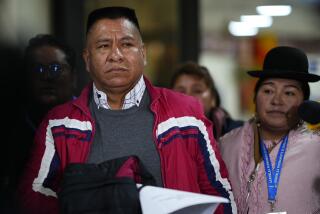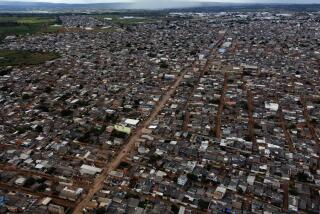Pope Francis visits a tough Brazilian slum
RIO DE JANEIRO -- Pope Francis waded into the heart of Brazil’s troubles Thursday with a visit to an often-violent slum that the government has provided with small improvements in a bid to stanch social unrest.
The pope’s venture into the Varginha favela may be the trickiest event in his week in Brazil, his first overseas trip since his election in March and one that has brought him to his native continent.
Security, already frayed by Francis’ tendency to ignore the restrictive rules, and sheer logistics were complicated as the visit began Thursday morning. The recently paved streets inside the favela are narrow; large parts of the slum are essentially in ruins, and the crowds, while perhaps admiring of the pope, are unpredictable in mood and potentially difficult to control.
The visit also illustrates the central pillar of his papacy: reaching out to the poor.
“I’m so excited I’m going to cry,” Rosa dos Santos, one of the residents expected to greet the pope, told reporters.
Less than 24 hours before the Argentine-born pontiff’s scheduled arrival, the neighborhood in an area of about 36,000 people was still getting spiffed up; new cement walls were being poured and state workers were laying electrical cables. Military police were out in full force, but drug traffickers’ graffiti kept reappearing.
“I am absolutely sure the only reason” for the improvements “is that the pope is coming,” said Rita de Cassia, 37, a sometimes maid who was helping out at the St. Jeronimo Emiliano church where the pope will pray during his visit.
Francis traveled to Varginha on Rio de Janeiro’s northern edge in a relatively modest silver sedan, not a limo, seated in the back and with the window rolled down. He then transferred to an open-sided “popemobile” from which he waved at followers and kissed the occasional baby hoisted in his direction.
Hundreds of residents and visiting pilgrims waited in cold, steady rain for the pope to arrive. Earlier in the day, he received the keys to the city and blessed some of Brazil’s potential Olympic athletes.
Varginha, built on old swampland, is one of several favelas that have been “pacified,” meaning the drug lords who once ran the place have been ejected or subdued by authorities, and the government has allocated money for community centers, libraries and a train station. But residents say they have received more broken promises than help, and basic services like sanitation remain woefully unavailable. They also complain that police are heavy-handed and abusive, treating everyone like a criminal.
Varginha is so poor and violent it is sometimes called the Gaza Strip.
ALSO:
Militants in Egypt’s Sinai Peninsula grow stronger
China indictment: Bo Xilai bribery trial could begin soon
Death toll in Spain derailment hits 77; terrorism ruled out
More to Read
Sign up for Essential California
The most important California stories and recommendations in your inbox every morning.
You may occasionally receive promotional content from the Los Angeles Times.











